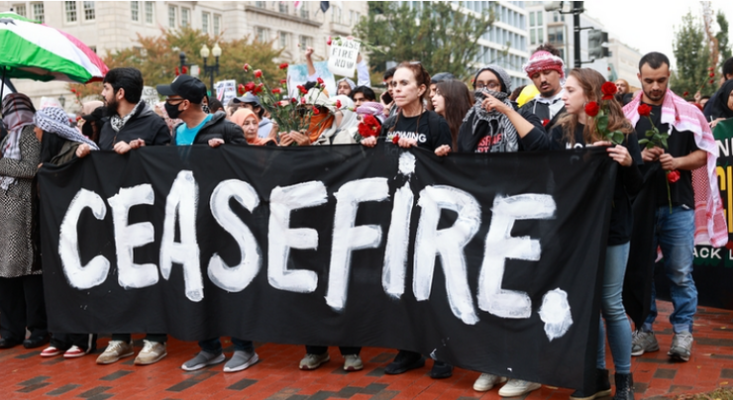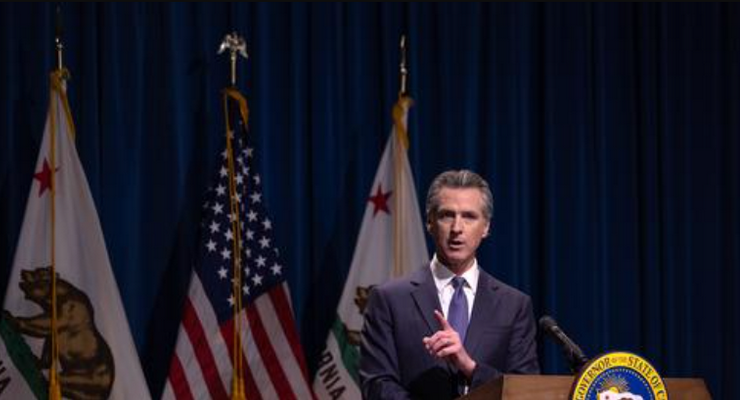 Three progressive Pasadena organizations advocate an ordinance completely uncoupling the Pasadena Police Department (PPD) from the federal Immigration and Customs Enforcement agency (ICE). The PPD’s relationship to ICE will be considered by the City Council on March 27. Some critics of the proposal to completely end all contacts between ICE and the PPD argue that it would undermine local law enforcement. The three organizations advocating 100% disentanglement from ICE – NDLON (the National Day Laborers Organizing Network), CLUE (Clergy and Laity United for Economic Justice), and POP! (Progressives Organizing for Progress) – argue the opposite and contend that a 100% non-cooperation policy would strengthen rather than weaken local policing.
Three progressive Pasadena organizations advocate an ordinance completely uncoupling the Pasadena Police Department (PPD) from the federal Immigration and Customs Enforcement agency (ICE). The PPD’s relationship to ICE will be considered by the City Council on March 27. Some critics of the proposal to completely end all contacts between ICE and the PPD argue that it would undermine local law enforcement. The three organizations advocating 100% disentanglement from ICE – NDLON (the National Day Laborers Organizing Network), CLUE (Clergy and Laity United for Economic Justice), and POP! (Progressives Organizing for Progress) – argue the opposite and contend that a 100% non-cooperation policy would strengthen rather than weaken local policing.
There is a thoughtful way to determine whether policing in Pasadena would be more effective with or without some PPD contacts with ICE. In this Op-Ed, we first analyze the harm from PPD contacts with ICE. We then discuss the arguable benefits from contacts with ICE. We conclude by comparing the asserted needs for PPD contacts with ICE in comparison to the harms from those contacts.
The harm from PPD contacts with ICE – vulnerable residents non cooperation with local police when they believe the police are in bed with ICE
The extended immigrant community’s non-cooperation with local police is the inevitable consequence of contacts with ICE. Knowing that the PPD has relationships with ICE is lethal to the cooperation the PPD needs from the extended immigrant community in order to properly investigate and prosecute crime. The “extended immigrant community” does not just mean the approximate 11 million undocumented immigrants in the U.S. It also means many millions more residents who are documented non-citizen immigrants whose green cards, visa cards, or other documentation giving them legal status can be revoked. But the extended immigrant community does not end there; it includes many more millions of citizens whose family members, spouses, friends, employers, and neighbors may be reluctant to cooperate with local police for fear that their contacts will expose non-citizen immigrants to deportation. For Pasadena, the extended immigrant community includes the majority of its Northwest Pasadena Latino community, but it extends to some extent throughout the entirety of Pasadena.
The empirical data on non-cooperation with local police because of perceived relationship between them and ICE presents a stark picture. Theodore “Insecure Communities: Latino Perceptions of Police Involvement in Immigration Enforcement” is a 2013 University of Illinois study that extensively surveyed LA County and 3 other counties when they become aware of police involvement in immigration enforcement. Among its conclusions were the following:
70% of undocumented immigrants were less likely to contact the police if they are victims of a crime;
44% of Latinos were less likely to contact police if they were victims of a crime because they fear that police officers will use this interaction as an opportunity to inquire into the immigration status of them or the persons they know;
45% of Latinos were less likely to cooperate with crime investigations or report crime for the same reason.
LAPD Police Chief Charlie Beck was quoted extensively about this phenomenon of non-cooperation in Steve Lopez’ January 29 LA Times article “Police Chief Beck won’t budge on immigration.” Chief Beck indicated that the problem is bigger than refusal to step up as witnesses. “A lot of people think, well, he’s talking about witnesses to crime, which I am. But I’m also talking about victims of crimes.” Chief Beck explained: “When you create a shadow population that fears any interaction with the law, then you create a whole class of victims, because they become prey for human predators who extort them or abuse them because they know they won’t contact the police.” (We don’t intend to gloss over the disparity between Chief Beck’s words and what many of his officers do, but that disparity warrants a whole other article.)
Chief Beck is not alone. The threat to policing from requiring local police to enforce federal immigration law is well-recognized by many progressive police chiefs. The professional organization of police chiefs, the International Association of Chiefs of Police, issued a policy statement on December 1, 2004, opposing any compulsory cooperation with ICE, saying “Many leaders in the law enforcement community have serious concerns about the chilling effect any measure of this nature would have on legal and illegal aliens reporting criminal activity or assisting police in criminal investigations. This lack of cooperation could diminish the ability of law enforcement agencies to police effectively their communities and protect the public they serve.” (The IACP recognized that there are police chiefs who disagree with this view).
In a January 30 LA Times article “Police wary of new duty”, LAPD Detective Brent Hopkins illustrated the non-cooperation problem he faces. He was trying to interview witnesses to an incident in which a motorist knocked down a construction worker. He introduced himself to a group of Latino workers. They walked away, with one of them saying “Trump is coming.” Hopkins was quoted as saying “It is my job to investigate crimes. And if I can’t do that, I can’t get justice for people because all of a sudden, I’m losing my witnesses or my victims because they’re afraid that talking to me is going to lead to them getting deported.”
While it may seem counter-intuitive, there is ample evidence that local policing is harmed by knowledge that local police have contacts with ICE. Any exceptions for the PPD to have contacts with ICE thus carry a heavy burden to demonstrate that the benefit of such contacts outweigh the damage to cooperation with local police that inevitably results from knowledge of those contacts.
The “really bad guy” exception – an exception without a demonstrable need and mission creep
To his credit, Pasadena PD Chief Phillip Sanchez – like LAPD Chief Beck and Detective Hopkins – recognizes that his police have trouble getting cooperation from many Northwest residents for a variety of reasons, and fear that his police are cooperating with ICE is one of them. To his further credit, Chief Sanchez’ police have drastically curtailed contacts with ICE since the last PPD-ICE joint operation 1 ½ years ago. In a December 2016, Pasadena Progressive Discussion Group forum Chief Sanchez assured the forum that it was not Pasadena PD policy to work with ICE. However, he referred to working with ICE on certain cases concerning dangerous bad guys and said “Surely, no one would disagree with that.”
We do disagree with Chief Sanchez because there is no demonstrable need for ICE/PPD cooperation in going after “really bad guys.” It is important to understand that “bad guy” does not mean what many people might assume. Some of those deemed “bad guys” are people who have served their time and have changed their lives. They are members of our communities, churches, and families. This “bad guy” exception has led, even under the previous administration, to the deportations of hundreds of thousands of people with minor infractions, including traffic violations, or who had no criminal record. People who commit serious crimes should be held accountable, and the US criminal system exists to ensure that they do. But the actions of a few should not be used to scapegoat or instill fear in an entire community.
But even if a “really bad guy” is undocumented, ICE does not need the Pasadena PD to detain and deport him. If the PPD has evidence that a “really bad guy” has committed a crime, the PPD has no need to involve ICE to prosecute him. Even though the PPD has apparently believed it had a continuing contractual relationship with ICE (through a series of MOUs that have not been signed by the required higher City authorities), it has chosen not to have any contacts with ICE for 1 ½ years. When the benefit of the PPD voluntarily working with ICE is so infrequent that there have been no ICE-PPD contacts for 1 ½ years, such infrequency indicates that the need for such contacts is insubstantial. But even with such insubstantial need for contacts, the damage to cooperation with local policing has been substantial from (1) the knowledge that there was a joint ICE-PPD operation 1 ½ years ago, (2) the knowledge that the PPD voluntarily entered into an MOU with ICE a week after Trump was elected that purported to obligate the PPD to dedicate officers to ICE investigations and joint operations “to the maximum extent feasible, and (3) the knowledge that Chief Sanchez was acting ultra vires because he ignored the requirement to get the City Manager’s signature? The balance between insubstantial need and substantial damages clearly weighs against the “really bad guy” exception.
In addition, there is the problem of mission creep. Reports on ICE sweeps after supposedly “really bad guys” repeatedly refer to “collateral” detainees – i.e., undocumented immigrants who are not “really bad guys” who get swept up in such ICE sweeps. Last year, ICE detained Xochitl Hernadez while doing a ride along with LAPD. ICE made unsubstantiated claims, based solely on racially biased speculations and where she lived, that Xochitl had gang affiliations. However, LAPD later confirmed Xochitl had no gang-related conviction or charges, and she was released after several months. Just last month, ICE came knocking on the door of the Ortiz family, claiming to be the “police” looking for a suspect. The man ICE claimed to be looking for did not live in the Ortiz’s house, but that did not stop ICE from taking Carlos Ortiz into custody. Carlos is a loving father and grandfather, a long time resident of Pasadena, and has no criminal convictions. Pasadena’s Mayor, City Council Members, City Manager and Police Chief need to think through whether they want to have to justify the next ICE sweep in town when the stories of the “collateral” damage of ICE hauling away hard-working parents, neighbors, friends, and workers flood into City Council meetings.
The “standby” exception – another exception without a demonstrable need
Another exception we’ve heard is that PPD officers should be on-site for ICE raids so that ICE agents would not have to call the police in the event there is trouble. The most recent permutation of this exception that we heard from a City Council Member was that PPD officers should be close in the event of trouble but far enough away that they wouldn’t be seen – implicitly recognizing the harm from any public PPD-ICE interaction but wanting to have it both ways.
The idea that ICE agents are not big boys who can take care of themselves would be laughable if the stakes were not so high in this matter. The simple answer to the “standby” exception is that ICE can take care of itself; if they have to have an extra ICE agent with a cell phone to call the PPD, let Trump’s ICE bear that cost, not the taxpayers of Pasadena.
The “Customs” exception – ICE is ICE, and another exception without a demonstrable need
A third exception argued against a 100% ban on voluntary contacts with ICE is that ICE’s customs activities should be exempted. ICE’s jurisdiction is, of course, immigration and customs enforcement. This exemption recognizes that the problem with ICE arises from its immigration enforcement and seeks to preserve contacts for its customs enforcement. This exemption fails to recognize the damage from any ICE contacts, and its need is even more insubstantial than any need to cooperate with ICE’s immigration enforcement.
ICE is ICE to the public – whether it is enforcing the immigration laws or the customs laws. The extended immigrant community is not going to differentiate between PPD contacts with ICE for immigration purposes vs. contacts with ICE for customs purposes. So the damage of non-cooperation with local law enforcement from ICE contacts will be substantially the same irrespective of what section of ICE is involved.
The need for contacts with ICE for customs enforcement appears to be even more insubstantial that any arguable need for immigration enforcement. Pasadena is not Long Beach nor San Pedro with a lot of customs issues at its ports. The most recent PPD-ICE cooperation was apparently for immigration enforcement. We doubt there have been any substantial customs enforcement contacts by the PPD with ICE, but, if there are, the burden of demonstrating such a need is on the proponents to such an exemption. We doubt that there have been any such contacts for a long time – reflecting that the infrequency of customs enforcement indicates an insubstantial need.
The loss of federal funds red herring
Some argue that there is a need to continue contacts with ICE because failure to do so will cause Pasadena to lose federal funds. Rebutting that red herring warranted the full op-ed on the subject by us that Pasadena Now just published. It demonstrates that the law generally does not require municipalities to enforce federal immigration law and that Trump’s fantasy that he can cut-off federal funds for state and local governments who choose not to participate in immigration enforcement is clearly fantasy. Somewhere between very little and none of Pasadena’s federal funds could be at risk by passing an ordinance prohibiting ICE contacts to the maximum extent permitted by law.
Balancing the non-cooperation downside from PPD-ICE contact and the absence of any meaningful benefit indicates that an ordinance barring all PPD-ICE contacts would strengthen local policing
NDLON, CLUE, and POP! have submitted to the Pasadena City Council a proposed “Pasadena Police Department Immigration Status and Bias-Free Policing Policy” that seeks to protect Pasadena’s most vulnerable residents – its undocumented and documented immigrants. Prohibiting PPD contacts with ICE to the maximum extent permitted by law is a cornerstone of that proposed immigrant-protection policy. It is warranted because the exceptions that have been articulated to a 100% ban on voluntary cooperation with ICE have insubstantial benefits. It is also the strongest policing policy for the Pasadena PD because it is the policy that most strongly counters non-cooperation with local policing by the extended immigrant community.
Lizbeth Mateo is an organizer for POP!; Skip Hickambottom and Dale Gronemeier are local civil rights attorneys. Portions of this article have previously been published in the LA Progressive that can be accessed at https://www.laprogressive.com/victor-gordo/;
Thanks to LA Progressive for permission to re-use in this article some verbatim language that has been previously published in that journal.














 42 comments
42 comments


